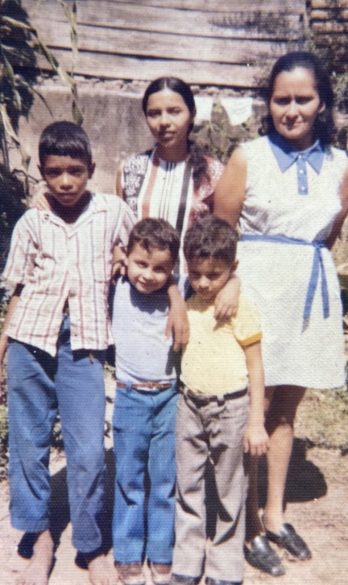By Rhina Guidos
SAN SALVADOR, El Salvador (CNS) – Unlike the spotless image of many holy men and women, a depiction of one of the new martyrs of the Catholic Church looks anything but polished.
The boy is hunched a little. His cuffed pants are slightly too big for his small body. His shirt, improperly unbuttoned, hangs just a bit longer on one side than the other. Bullet casings are at the bare feet of the unpolished martyr.
That’s the image his parish in El Paisnal, El Salvador, presented to the world, with the message that the most simple and poor, like Nelson Rutilio Lemus, a teenage boy, are worthy of the grace of martyrdom. Lemus was assassinated in his rural hometown next to his pastor, Jesuit Father Rutilio Grande, and sacristan Manuel Solórzano, March 12, 1977.
The three, along with Franciscan Father Cosme Spessotto, were beatified Jan. 22 in an outdoor evening ceremony attended by their families – some from the U.S. and Blessed Spessotto’s native Italy – at Salvador del Mundo Plaza in San Salvador. Beatification is one of the final steps toward sainthood.

Salvadoran Cardinal Gregorio Rosa Chavez, who presided at the ceremony, placed the martyrs’ and the Catholic Church’s role into the context of the country’s civil conflict in the 1970s and 1980s, which ended with peace accords in 1992. The martyrs beatified were part of more than 75,000 civilians killed.
“Those of us who have lived this experience intensely, those who have experienced firsthand the drama of institutionalized violence, of the violence of the armed conflict and of daily violence, fill this square and its surroundings,” the cardinal said during the homily for the beatifications. “Of the four martyrs of El Salvador who have just been beatified, we can say what John (in the Gospel) affirms … that ‘they come from the great tribulation’ and ‘that they have washed their clothes and made them white with the blood of the Lamb.’”
The war and the period before it, El Salvador’s “great tribulation,” brought with it hatred, revenge, pain, destruction, terror, death, slander and stigmatization against defenseless people, he said, and the blesseds, like the poor, bore the brunt of its calamities.
Blessed Spessotto was shot point-blank as he prayed inside his church June 14, 1980. A bullet hole from the attack remains inside the church.
Blessed Grande’s car was ambushed on the way to a novena. His assassins left his body and that of his companions, a teenager and an elderly man, riddled with so many bullets that parishioners had to carry them in blankets to keep their corpses from falling apart.
“In Latin America, martyrdom is related to the experience of the Gospel and the doctrine of the church above all after the Second Vatican Council,” and its adaptation to the realities the church in the region was facing, Cardinal Rosa Chavez said.
The poverty and injustices suffered by Blesseds Lemus and Solórzano – but also their devotion to remain with a pastor whose life was in danger – represented “a window to peer into the reality” of what the Book of Revelations calls “a great multitude that no one could number,” a nod to all Salvadoran lay Catholics who died and disappeared in the war, Cardinal Rosa Chavez said.
To the criminals who took the martyrs’ lives, “we want to say to them … that we love them” and ask God that they repent and have a change of heart, the cardinal said, “because the church is not capable of hate. The only enemies (the church) has are those who declare themselves so.”
At the Vatican Jan. 23, Pope Francis, in comments following Sunday’s customary Angelus prayer in St. Peter’s Square, mentioned the blesseds.
“They stood by the poor, bearing witness to the Gospel, truth and justice, even to the shedding of their blood,” he said. “May their heroic example arouse in everyone the desire to be courageous agents of fraternity and peace. Let us applaud the new blesseds!”
